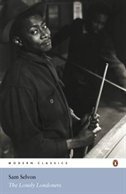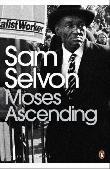 And so we come to the final volume of Sam Selvon’s London trilogy, Moses Migrating. I reviewed the background and first two volumes of the trilogy a few weeks ago. As a short refresher, we first meet Moses Aloetta on the platform at Waterloo Station, waiting for the boat train with new immigrants to arrive — The Lonely Londoners is an exploration of what blacks (all known as Jamaicans) experienced in the London of the 1950s. In Moses Ascending, published in 1975, Moses had moved “up” and bought a condemned building of flats in Shepherd’s Bush, installing himself as the landlord in the penthouse. Alas, things have become worse for blacks in Britain and get worse for Moses, who ends up living in his own basement. In a bitter way, that’s where we have left Moses so far.
And so we come to the final volume of Sam Selvon’s London trilogy, Moses Migrating. I reviewed the background and first two volumes of the trilogy a few weeks ago. As a short refresher, we first meet Moses Aloetta on the platform at Waterloo Station, waiting for the boat train with new immigrants to arrive — The Lonely Londoners is an exploration of what blacks (all known as Jamaicans) experienced in the London of the 1950s. In Moses Ascending, published in 1975, Moses had moved “up” and bought a condemned building of flats in Shepherd’s Bush, installing himself as the landlord in the penthouse. Alas, things have become worse for blacks in Britain and get worse for Moses, who ends up living in his own basement. In a bitter way, that’s where we have left Moses so far.
So where do we find him eight years later when Moses Migrating opens?
I don’t rightly recollect when it was the idea of going back home hit me. It could have been one time of any time when I was down in the dumps to pick up the apples that fall when my cart upset. But I could tell you one thing for sure, that down there in the grimy basement in Shepherd’s Bush, feeling like a trapped animal while my erstwhile (white) lackey Bob and his bride Jeannie occupied my penthouse on the top floor, it was not hard to wish for a change of scenery and circumstances.
Moses is going “home” to Trinidad but, being Moses, even he is not sure whether this is a visit to celebrate the Carnival or a permanent relocation (“Just entertaining the idea of leaving Brit’n gave me the creeps.”) And so we head to Waterloo station and the boat train again — this time going in the opposite direction. Moses has retained ownership of the Shepherd’s Bush tenement (just in case he comes back), with Galahad in charge as manager.
The first of Moses Migrating‘s three themes is the story of the boat trip to Trinidad; it is a kind of a floating version of Moses’ London. He is stuck in cabin 13B, on the lowest possible deck next to the engine room, with three cabin mates — two black, one white — in a “community” not unlike that he experienced in London.
Lackey Bob and his wife Jeannie, are spending some of their new-found wealth and are on their way as well to celebrate Carnival. They are in first class but they arrange for Moses to be able to visit them by passing him off as their chauffeur and handyman. The class structure of London has been repeated on the boat. Moses’ voyage “home” is beginning to look a lot like the recent past. It is an omen that when the cruise ship pulls into dock, Moses is not only not on deck to bear witness to his return to Trinidad, he’s passed out drunk in his bunk.
The second theme of this final book explores our hero’s attempts to relocate himself into this old world. He takes up residence at “de Hilton” — where class structures are again replicated — but spies his Tanty Flora (the woman who raised him) selling oranges across the street on his first morning there. He begins to visit Tanty in her slum and finds Doris (the new orphan Tanty has adopted, just as she took in Moses), with whom he promptly falls in love.
Throughout this section, Selvon does an excellent job of exploring the conflict that Moses is experiencing — of class, of location, of just what is “home”. None of these have answers, so he has created his own:
Out on deck, ere we left the English Channel, I had come to the conclusion as Brit’n faded on the horizon that I would be a credit to the country, an ambassador not only of goodwill but good manners. The idea put a different complexion on my circumstances. I now had a purpose, which was to show the outlanders in the Caribbean that Brit’n was not only still on her feet, but also still the onlyest country in the world where good breeding and culture come before ill-gotten gains or calls of the flesh. I would go forth with a stout heart and proclaim that Johnny Walker was still going strong, that the British bulldog still had teeth, that Britannia still ruled the waves. This self-imposed undertaking not only steeled me but fired my ambitions.
And so Moses, who does not find anywhere now to be home, sets himself the goal of explaining the one he has just left to the one he left more than 25 years earlier. The overwhelming sense of hopeless dislocation begins to grow.
Part three of the book is introduced when Moses arrives at the inspiration that, for Carnival (that’s the pre-Lent festival which is every bit as important in Trinidad as the more famous, bigger versions in New Orleans and Rio), he will appear as the image of Britannia from the recently discontinued one pee coin. (I toyed with putting the image in this post, but in some ways it would be a visual spoiler for those who want to create their own version as they read — if you want to see it, click here.) Tanty and Doris agree to make him a costume, shield and trident and cart so that he can be paraded before the Carnival judges. A black male, posing as Britannia from the one pee coin. In the final touches, white lackey Bob will pull the cart, Jeannie will be a fawning subject at Britannia’s feet and a tape recorder hidden under Moses/Britannia’s robe will play Rule Britannia as he passes the judging stand.
Going any further on the plot in this book would be a spoiler. Let me just say that it is a more than fitting conclusion to an amazing trilogy.
Moses is not “rootless”, rather wherever he has lived, try as he might, he has never been able to establish any viable roots that will last. The diaspora and dislocation that he is part of comes from the remnants of Empires that have now ended — the Caribbean blacks went to London, followed by the Commonwealth Asians; the other faded Empires, such as France, had their own versions. The tensions this dislocation caused in the Mother Countries are well-documented but what it felt like to the individuals involved far less so. Selvon’s trilogy is an exploration of how hope turned into hopelessness, not just for Moses but for many like him.
It is also a story with incredible contemporary relevance. While the decline of Empire caused the diaspora that Moses is part of, the rise of the global economy has caused an even more complex one today. Jobs have definitely moved, but labor must be equally mobile. The underclasses that were necessary to make London function in The Lonely Londoners are every bit as necessary in the cities of today, only now there are far more cities involved. The tensions and feelings that Selvon explores now exist not only in London and New York, but even in second-tier First World countries like Canada and Australia — “immigration” is an issue everywhere.
Selvon’s trilogy deserves to be read in that context. Certainly the world he explores is less complex than today’s, but that in itself is an advantage because it clarifies the issues and brings them into focus. Moses is an example whose experience is being recreated globally today — and his inability not just to go “home” but to find a home has a painful pathos to it. The Lonely Londoners, the best known of this trilogy, does stand as a book alone — it is only when you also read Moses Ascending and Moses Migrating that you begin to see Selvon’s much bigger picture.
For an interesting contemporary exploration of a book that deals with similar, but current, themes check out Trevor Berrett’s review and interview with Imran Ahmad on his book Unimagined, a Moslem boy meets the West (and I admit to not yet having read the book). The interview in particular offers some guideposts to connecting Selvon’s world with that of today.
Also, an update on availability. As noted in my earlier post, I couldn’t find a copy of Moses Migrating when I started this project — Rienner fortuitously published one at year end 2008. The volume I have says they are also publishing it in the United Kingdom. I can’t find it on any of my normal book-buying sites in the UK but would presume it will be available soon.
I suspect these availability issues, different publishers and the periodic disappearance of these books from backlists illustrates copyright issues that have kept Selvon’s work unjustly in the background. I can only conclude by saying that this trilogy represents three books which readers will find most rewarding. Selvon deserves the last word as Moses tries to state why he can’t explain Britain to Doris:
But how can she understand how much I owe the country that took me in and nursed me all these years? I was hungry and they gave me fish and chips; I was thirsty and they gave me a cuppa; I was penniless and they gave me dole; I was destitute and today I am Landlord of a Mansions in West London. I was even awarded a prize once, Tanty, by the National Front, which is the very British they say against black people.”
“A prize, Moses?”
“Yes, a one-way air ticket to Jamaica. If I had return fare I would of gone, too.”
 The Lonely Londoners, by Sam Selvon
The Lonely Londoners, by Sam Selvon And so we are introduced to The Lonely Londoners, a novel first published in 1956 that is every bit as relevant today. In a few pages, in “creole” dialect, we will be introduced to Harry “Sir Galahad” Oliver (that’s whom Moses is meeting), Big City, Five Past Twelve, Harris and a host of others. Welcome to the London of the mid-1950s. All written by the man who would become known as the “father of black writing” in Britain.
And so we are introduced to The Lonely Londoners, a novel first published in 1956 that is every bit as relevant today. In a few pages, in “creole” dialect, we will be introduced to Harry “Sir Galahad” Oliver (that’s whom Moses is meeting), Big City, Five Past Twelve, Harris and a host of others. Welcome to the London of the mid-1950s. All written by the man who would become known as the “father of black writing” in Britain.